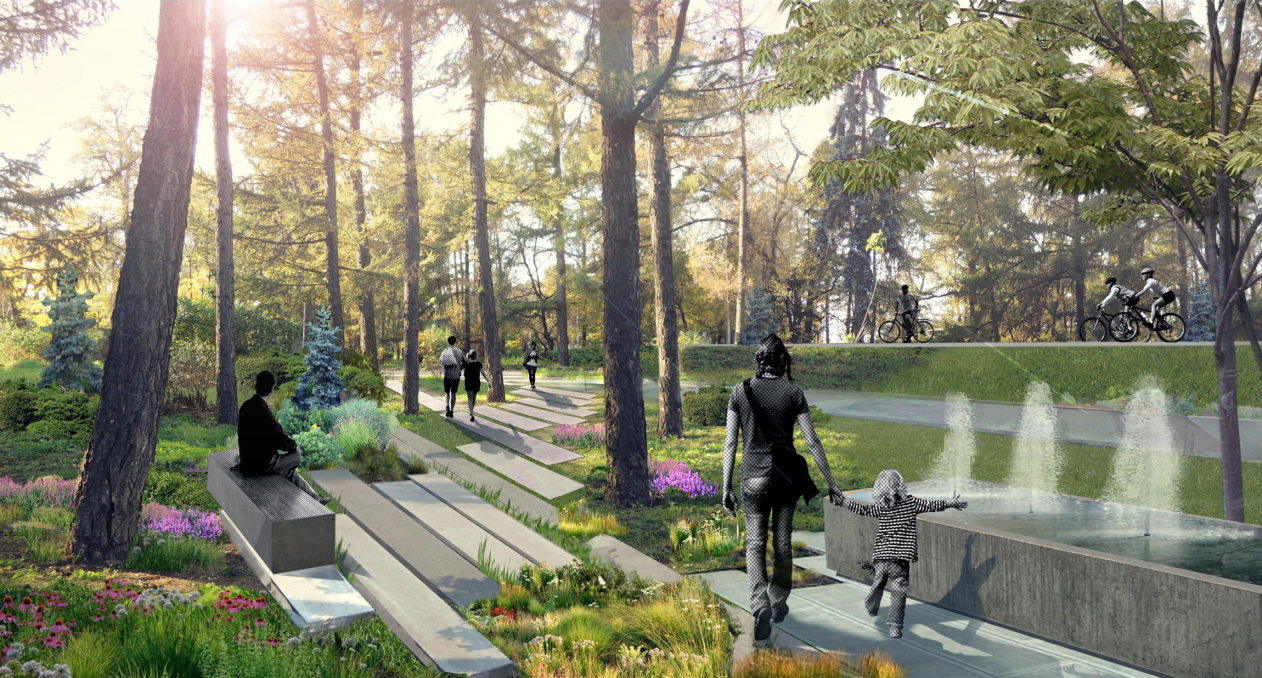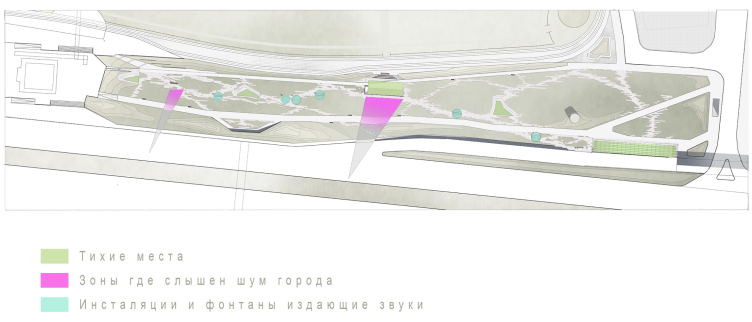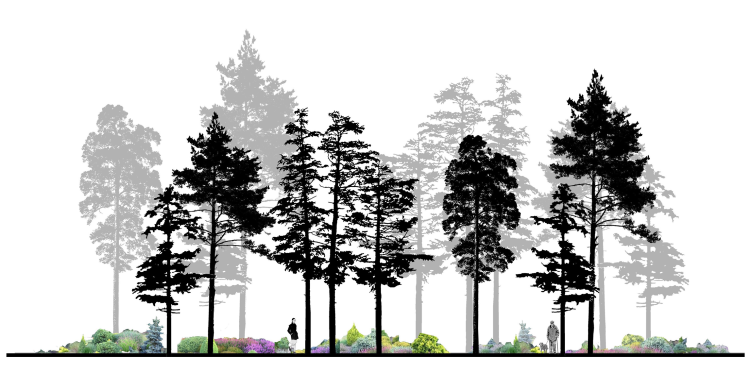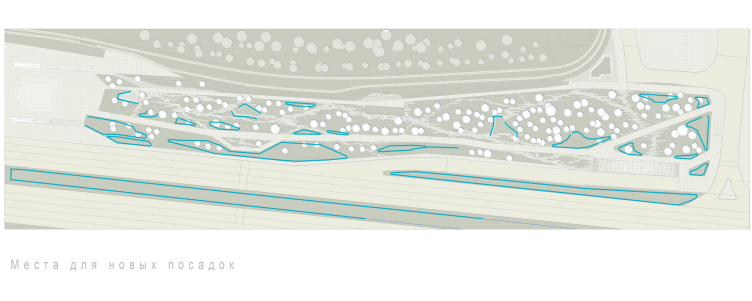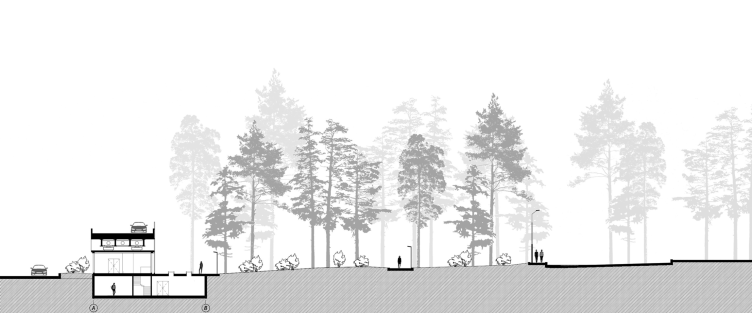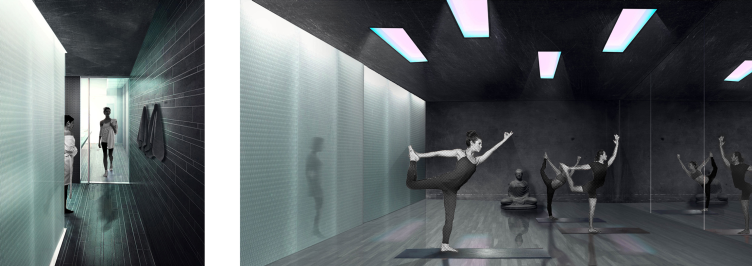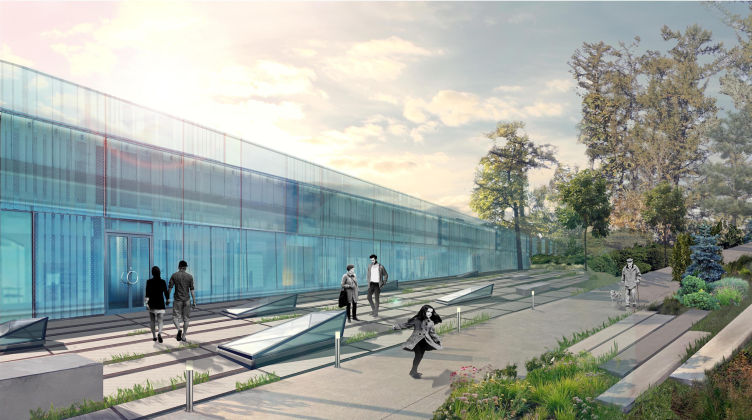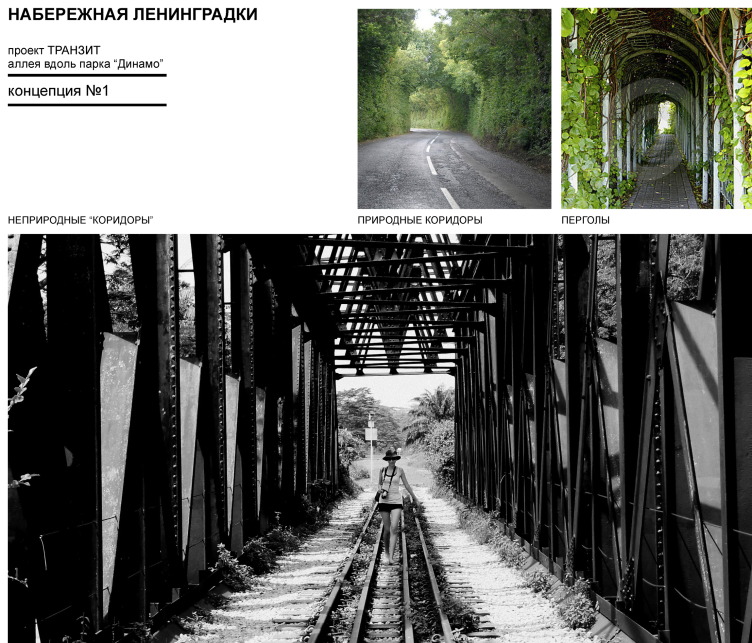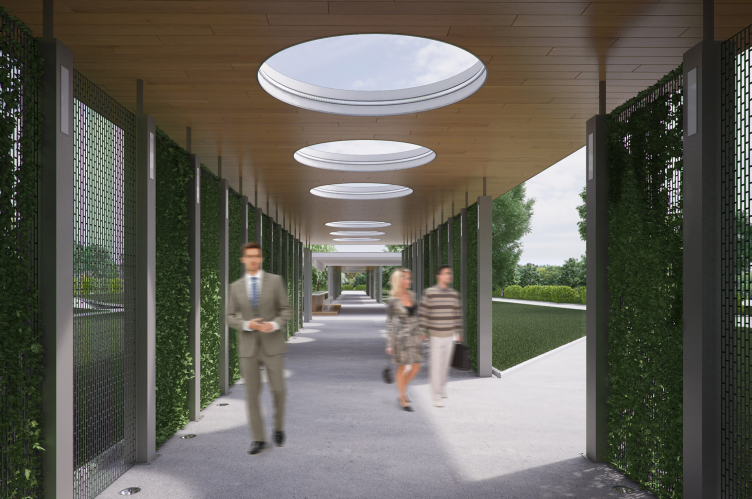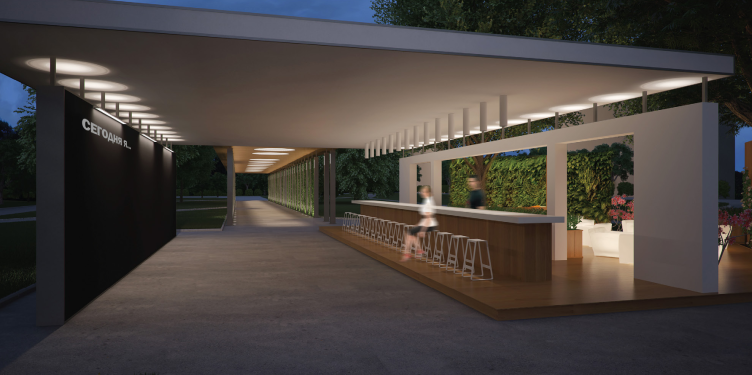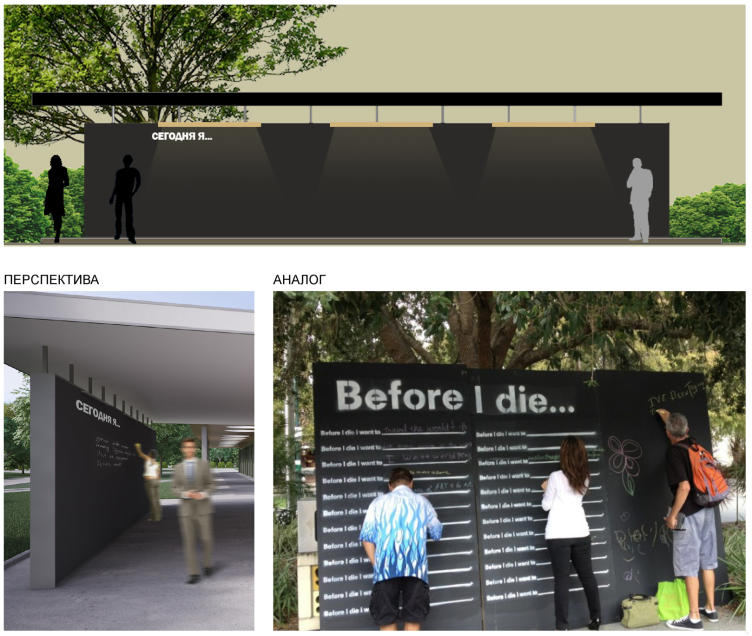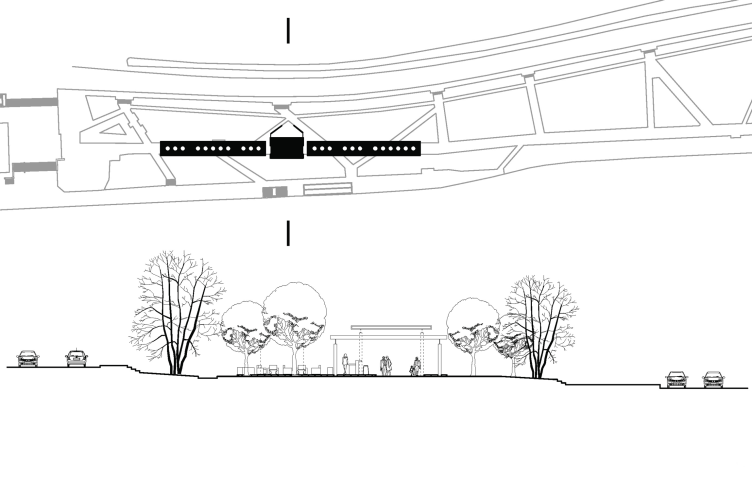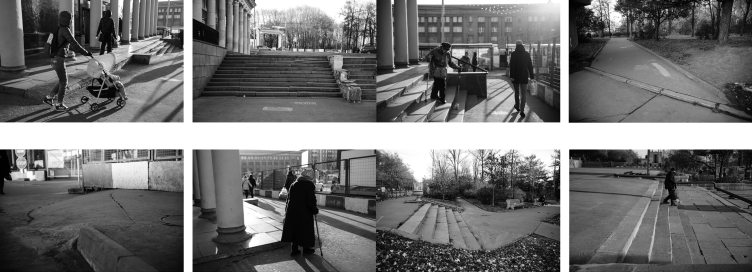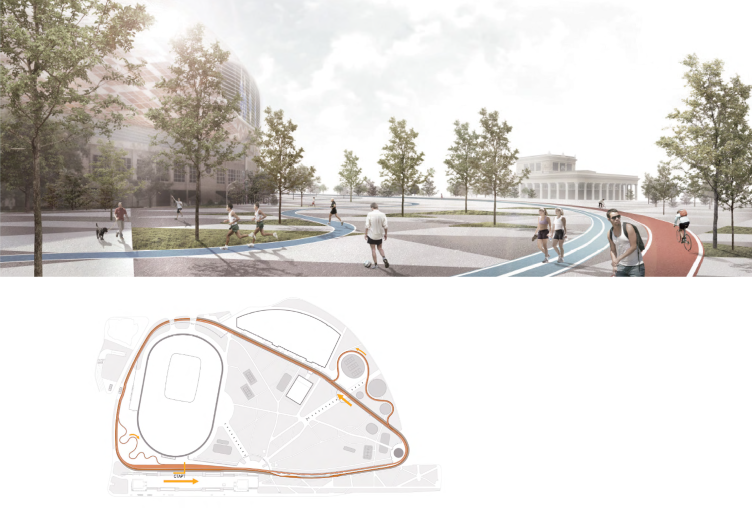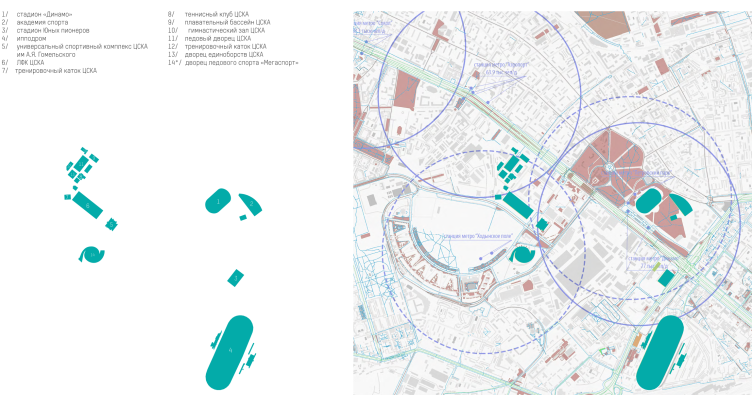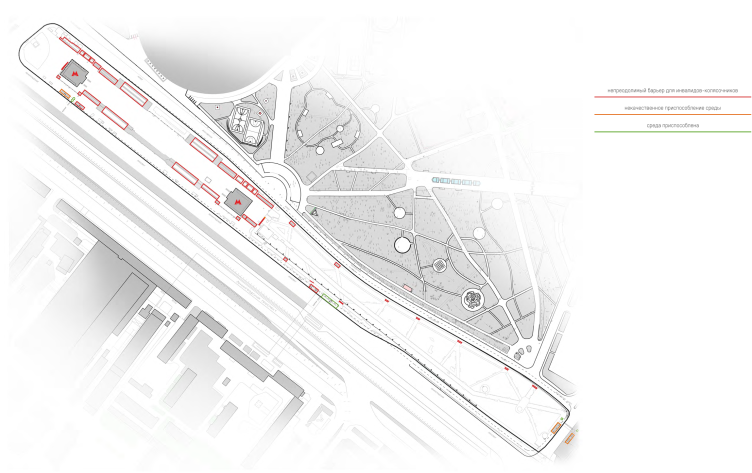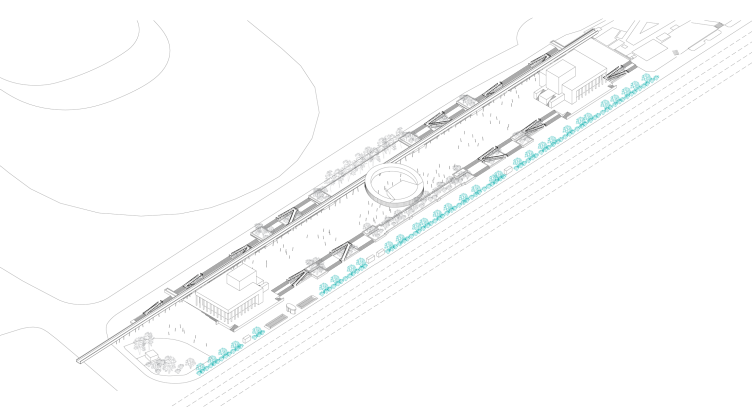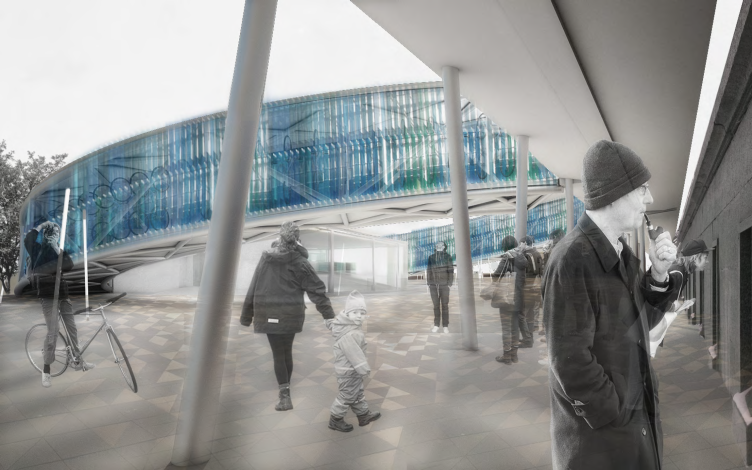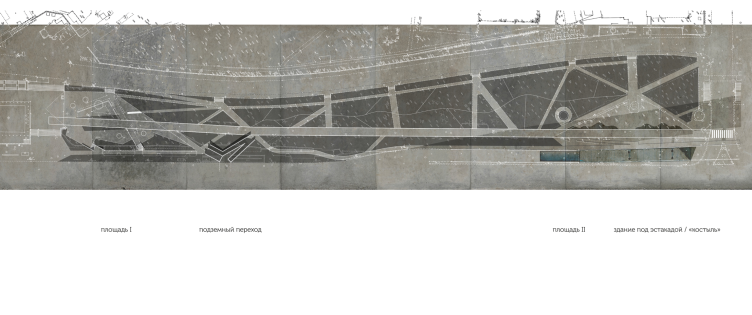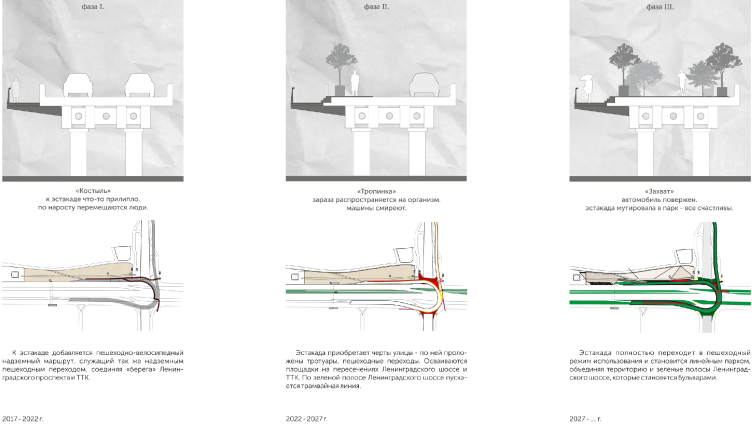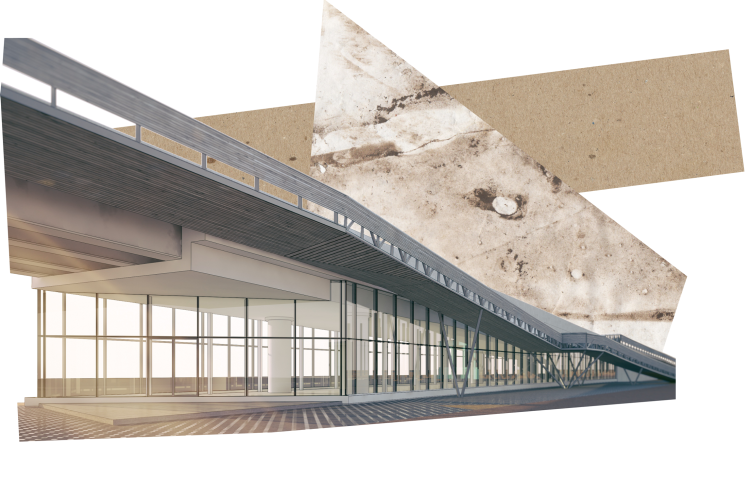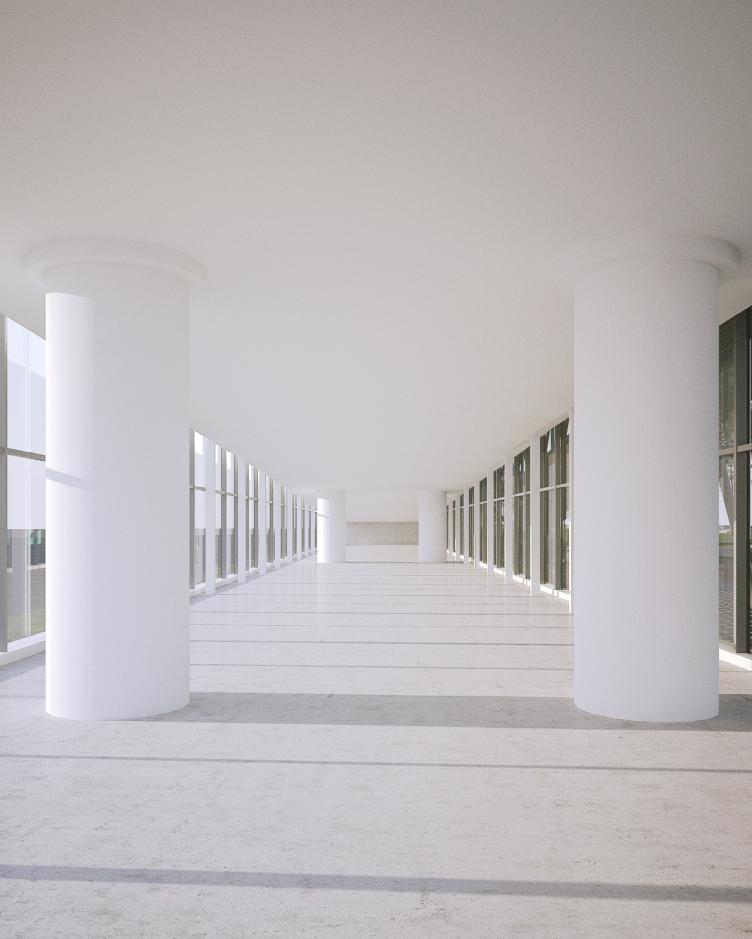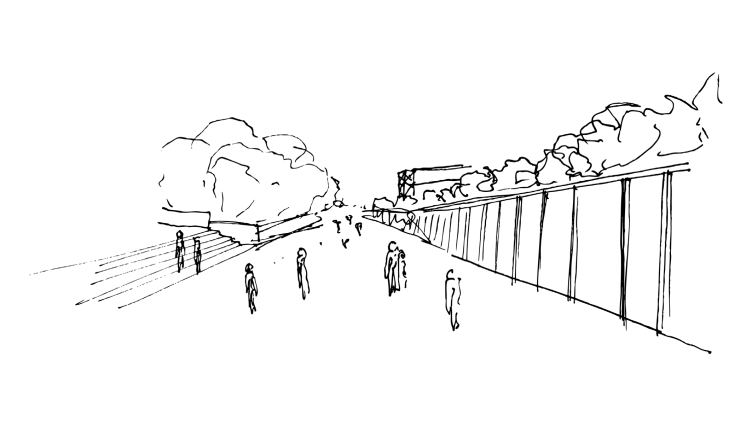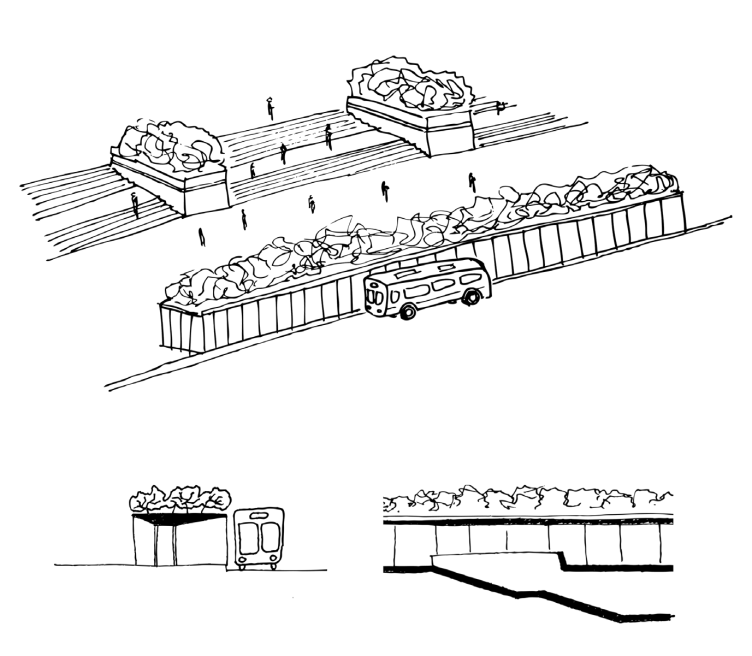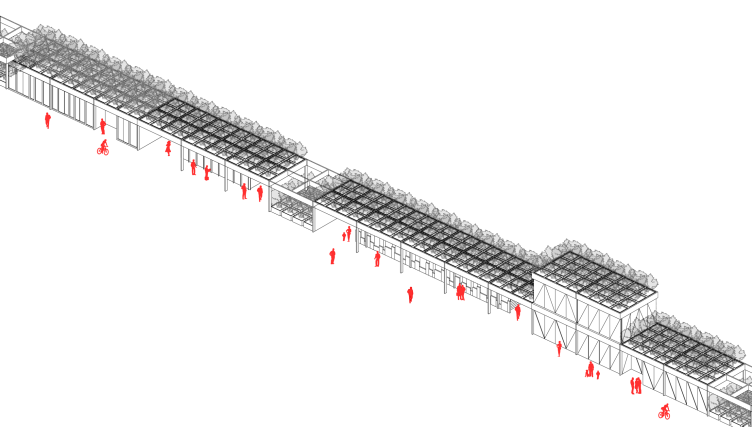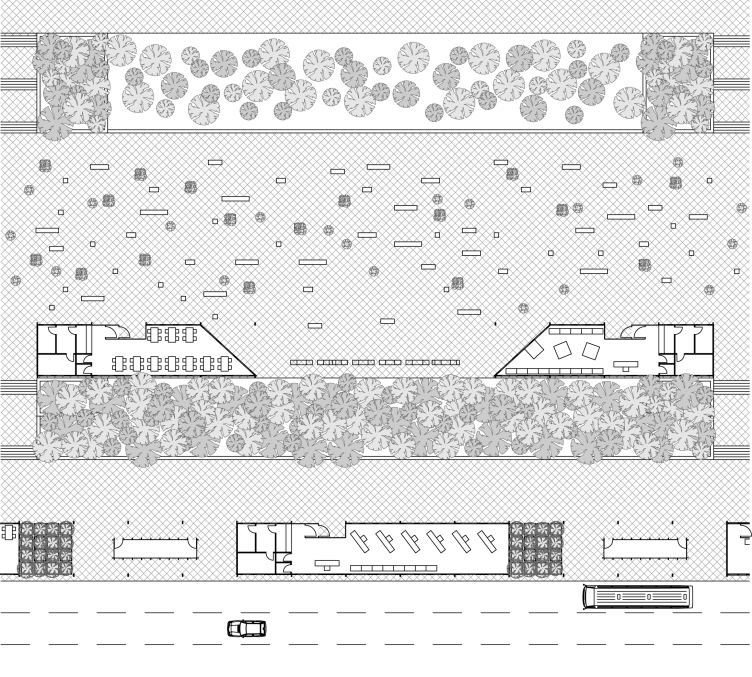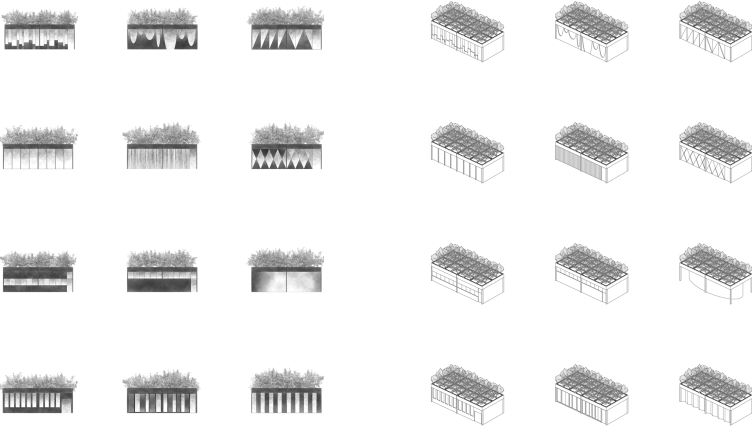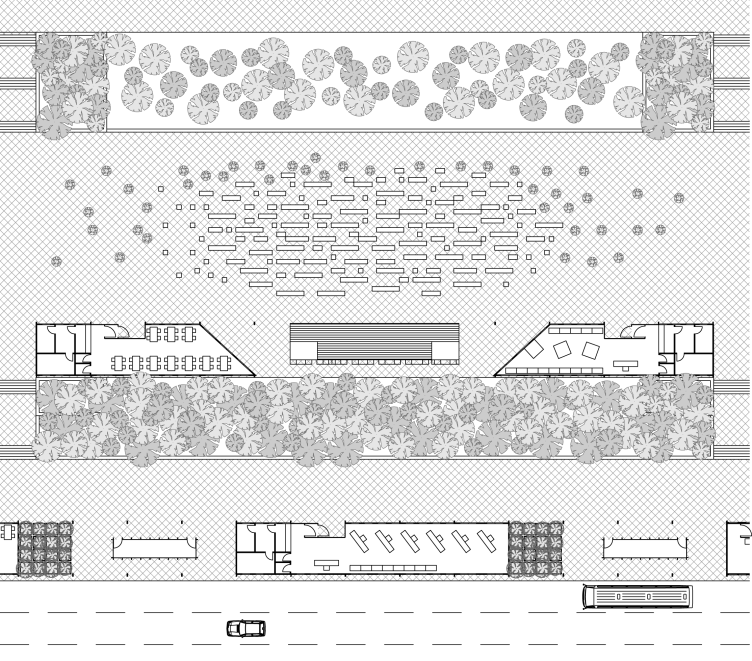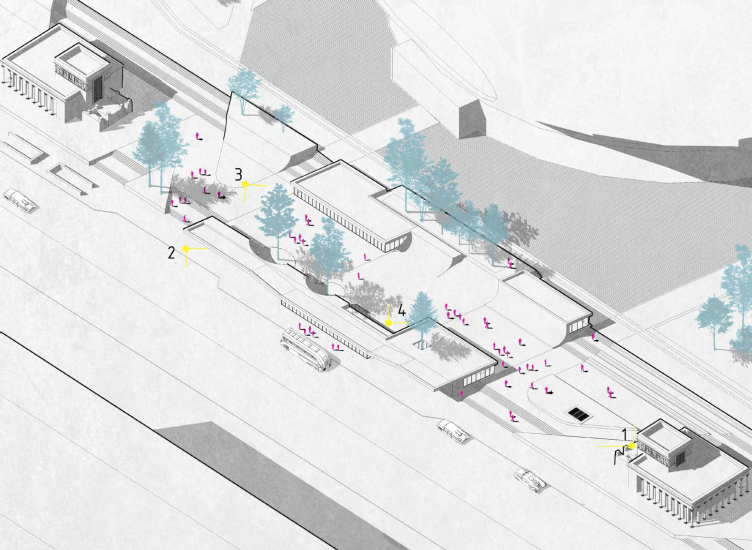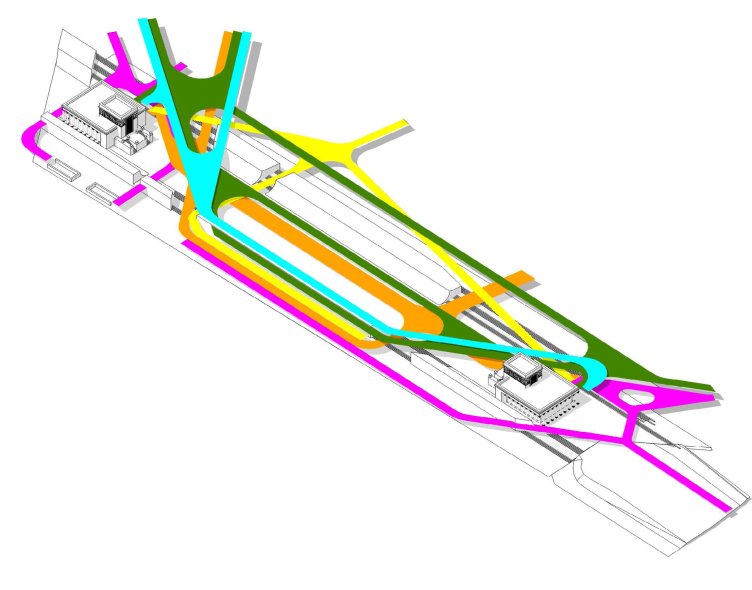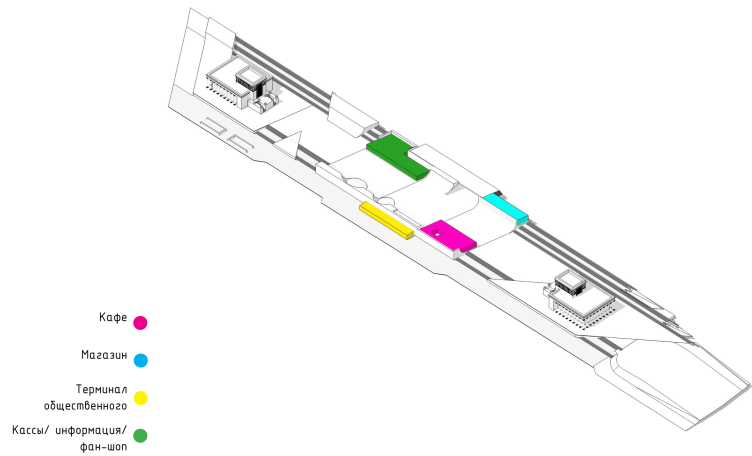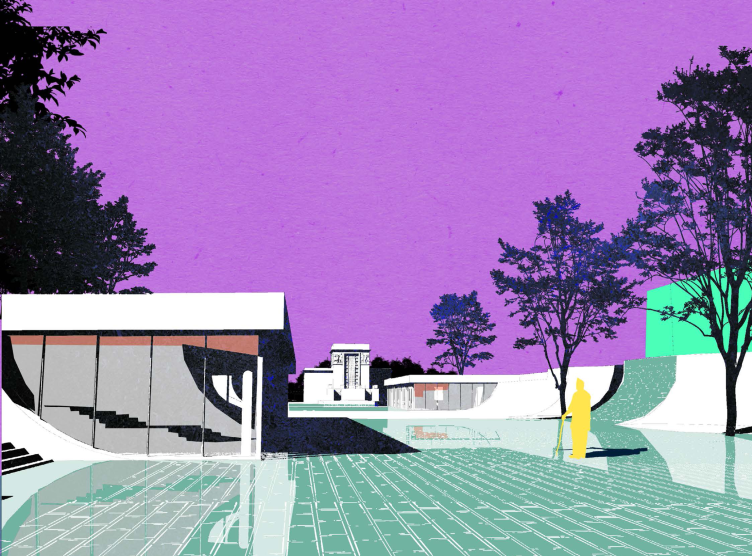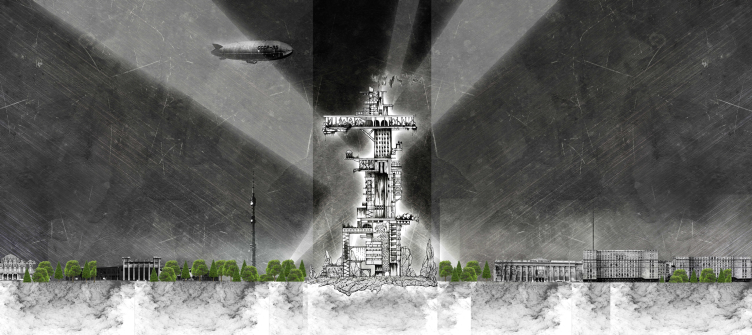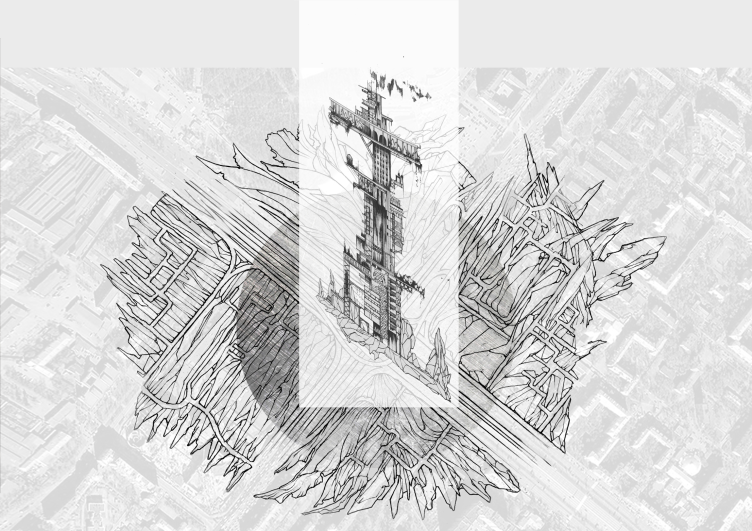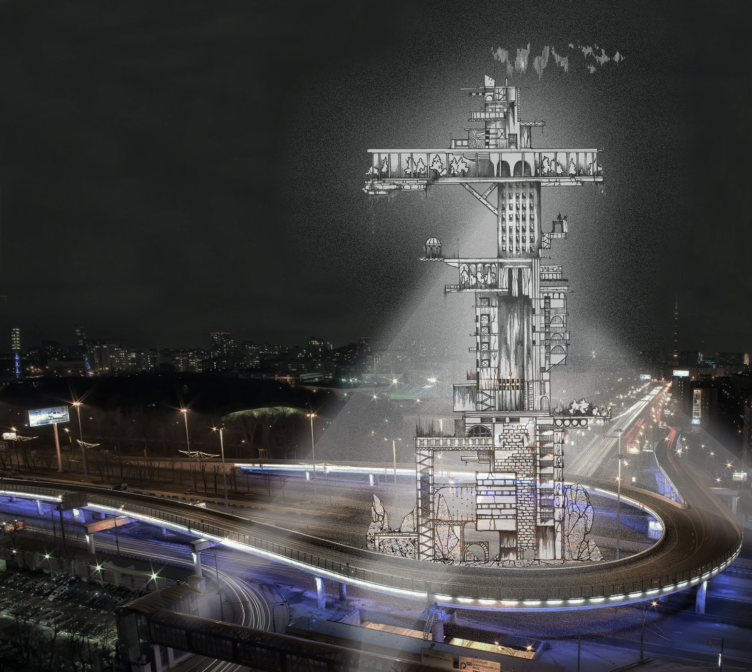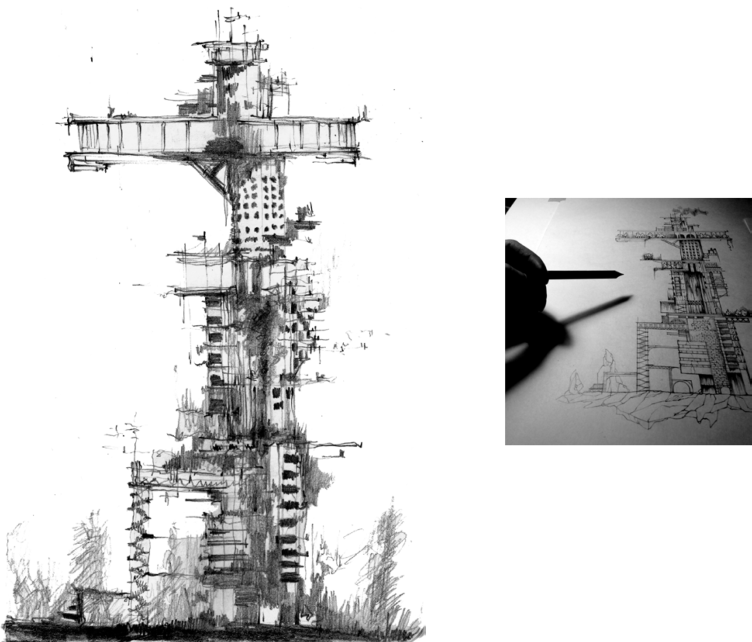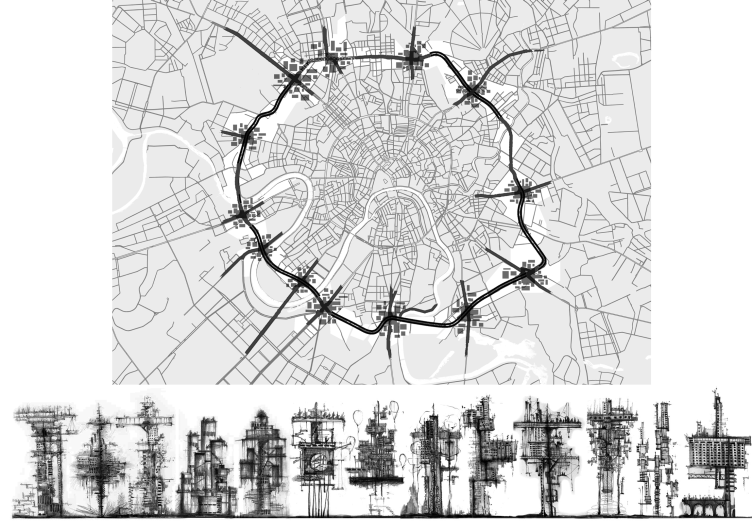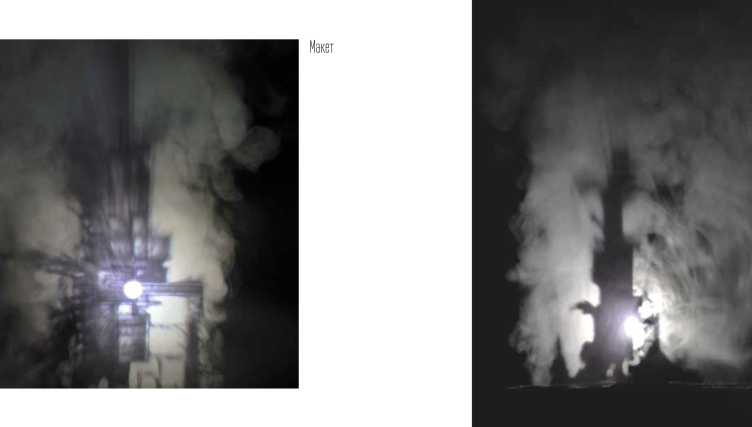***
Contest winners
The First Place + People's Choice Award
Ksenia Zvereva
Visualization of a fragment of the boulevard. Concept of "Dinamo" Boulevard. Author: Ksenia Zvereva
The concept is all about the sonic diversity of the territory. Using the mobile application for measuring the noise level, Ksenia determined the places that are most susceptible to the noise pollution. For example, a large level of noise was discovered opposite the "slab" of a large residential building whose facade reflects the sound. According to the conclusions made by the authors of the project, the reason for the noise pollution of the boulevard is "the absence of the medium green belt". The bushes and the small trees might absorb the noise close to the ground. Strengthening this medium green belt became the key idea of the project. However, according to the architect, there is no necessity to get rid of the noise altogether - because it forms the unique "sonic portrait" of this particular territory. Because of that, it is proposed that at some places the city noise should be kept as it is, and sometimes even augmented with extra sources of sound, fountains for example. Thus, the boulevard gets a peculiar "sonic tour route". Developing her idea of sonic variety, Ksenia proposed to organize, under the junction flyover, a yoga center that will be opposed to the noisy and crowded stadium and at the same time will support the sport theme intrinsic to this place.
Diagram of noise attractions. Concept of "Dinamo" Boulevard. Author: Ksenia Zvereva
Section of the boulevard with an extra medium green belt. Concept of "Dinamo" Boulevard. Author: Ksenia Zvereva
Plan of the green noise screens. Concept of "Dinamo" Boulevard. Author: Ksenia Zvereva
Section of the flyover and the yoga center. Concept of "Dinamo" Boulevard. Author: Ksenia Zvereva
Interior of the yoga center. Concept of "Dinamo" Boulevard. Author: Ksenia Zvereva
The square in front of the yoga center. Concept of "Dinamo" Boulevard. Author: Ksenia Zvereva
***
The Second PlaceAnastasia Rozhkova
Examples: natural and man-made corridors. Concept of "Dinamo" Boulevard. Author: Anastasia Rozhkova
The project is aimed at organizing and comfortably using the boulevard in spite of the proximity of a construction site and a noisy highway. Anastasia proposes to create a covered boulevard whose vertical green belt will protect it from the world outside. There is a bar counter that runs directly along the pedestrian path. Across from it, the authors place a blackboard where anybody can leave a note. Here one can organize weekend bazaars and flea markets, the kind that you can see on the boulevards of European cities.
Visualization of the covered passage. Concept of "Dinamo" Boulevard. Author: Anastasia Rozhkova
Visualization of the summer cafe. Concept of "Dinamo"Boulevard. Author: Anastasia Rozhkova
Self-expression wall. Concept of "Dinamo"Boulevard. Author: Anastasia Rozhkova
Diagrams of the location of the covered passage on the master plan and the cross section of the boulevard. Concept of "Dinamo"Boulevard. Author: Anastasia Rozhkova
***
The Third PlaceDaria Gerasimova
Environment accessibility analysis. Photo fixation of existing situation. Concept of "Dinamo" Boulevard. Author: Daria Gerasimova
Daria Gerasimova's project is based on the idea of accessibility of the boulevard and the square for the handicapped people. In order to make the territory accessible, the authors propose to replace some of the stairways with zigzag ramps. Besides, according to the author, "Dinamo" Stadium lacks the necessary bicycle infrastructure. In its contest project, for Park of Physical Culture and Sport, "Praktika" proposes to create a bicycle ring that would belt both the park and the stadium. Daria thinks that it is necessary to expand the ring as far as the Petrovsky Park, and, when it runs through the square, elevate the bicycle track over the ground level so as to avoid interfering with the flows of pedestrians and the support crowds during the games. In the center of the square, there is a bicycle renting point and a small cafe. The circular ramp will allow for the cyclists to get up the the level of the bicycle track.
Bicycle track from "Praktika"Bureau. Concept of "Dinamo" Boulevard. Author: Daria Gerasimova
Map of sports facilities in the proximity of Dinamo. Concept of "Dinamo" Boulevard. Author: Daria Gerasimova
Environment accessibility analysis. Map of the problem spots. Concept of "Dinamo" Boulevard. Author: Daria Gerasimova
Overview with the bicycle station. Concept of "Dinamo" Boulevard. Author: Daria Gerasimova
"Dinamo"bicycle station. Visualization. Concept of "Dinamo" Boulevard. Author: Daria Gerasimova
***
Contest FinalistsAnton Timofeev
Sketch of new zoning of the boulevard. Concept of "Dinamo" Boulevard. Author: Anton Timofeev
The author dedicated his research to the automotive situation on the highways adjacent to the boulevard. His conclusion runs as follows: in the nearest future, a large part of the local population will be forced to opt out of using their cars in favor of public transportation, and the necessity of multi-level road junctions will be no longer there. The flyovers are turned into linear parks, similar to New-York's High Line. Anton suggests to start preparing people for these changes today. The three-phase scenario that the author has come up with is called "Crutch - Trail - Seizure". The idea is about adding a pedestrian and bicycle trail "crutch" to the flyover. With time, they will also be able to "seize" the carriage way. The space under the flyover may be used as expo space for organizing fairs and exhibitions.
Map of the boulevard with regard to the proposed changes. Concept of "Dinamo" Boulevard. Author: Anton Timofeev
"Crutch - trail - seizure". Concept of "Dinamo" Boulevard. Author: Anton Timofeev
Glazed venue beneath the flyover and the "crutch". Concept of "Dinamo" Boulevard. Author: Anton Timofeev
Interior of the space beneath the flyover. Concept of "Dinamo" Boulevard. Author: Anton Timofeev
***
Andrew FomichevSketches of the modular structure and the square behind it. Concept of "Dinamo" Boulevard. Author: Andrew Fomichev.
According to the research done by Andrew Fomichev, the place that suffers the most from the adverse effects of the highway is the square between the pavilions of the "Dinamo" metro station as well as the part of the boulevard not covered by the flyover. The author also paid attention to the bus stops and retail kiosks scattered chaotically along the Leningrad Avenue. As the key idea, Andrew proposed to implement, on the sidewalk running along the Leningrad Avenue, a modular "transformer" structure. This structure consists, among other things, of "green modules" (bushes in tubs), bus stop modules, cafe modules, and others. The structure can be adjusted and fine-tuned to fit the current specific tasks. By relocating the mobile benches and tubs, for example, one could use the territory as a festival venue, a promenade, or even a skating rink in the wintertime.
"Green" module. Concept of "Dinamo" Boulevard. Author: Andrew Fomichev.
Fragment of the transformer structure. Concept of "Dinamo" Boulevard. Author: Andrew Fomichev.
Example of placing the benches and the tubs on the square on a regular day. Concept of "Dinamo" Boulevard. Author: Andrew Fomichev.
Facade solutions. Concept of "Dinamo" Boulevard. Author: Andrew Fomichev.
Organizing the space for an open-air festival. Concept of "Dinamo" Boulevard. Author: Andrew Fomichev.
***
Oleg SazonovOverview of the square. Concept of "Dinamo" Boulevard. Author: Oleg Sazonov
The author of the project notes the important role of this territory as a link between two parks (Petrovsky and Dinamo). However, the square is not properly organized, and, according to the recent opinion poll, is not really popular with the local people. Oleg proposed to raise the popularity of this place by attracting to it the lovers of extreme sports. The composition is built around a half-pipe that performs, aside from its immediate sport function, a number of other ones (it houses the stadium's booking office, a stage for open-air festivals, a cafe, and a retail store). Ultimately, we see a picturesque enfilade of spaces with diverse functions, securely protected from the noise of the highway. Using this "structure", one can easily get from one park to the other. Yet another solution proposed by the author is creating a terminal for the above-ground transportation that will include the stops of all kinds of transport that runs through this area.
Superposition of the pedestrian flows. Concept of "Dinamo" Boulevard. Author: Oleg Sazonov
Addition of functions. Concept of "Dinamo" Boulevard. Author: Oleg Sazonov
Visualization of the enfilade. Concept of "Dinamo" Boulevard. Author: Oleg Sazonov
***
Daria ZaitsevaDeveloped view along the Leningrad Avenue. Concept of "Dinamo" Boulevard. Author: Daria Zaitseva
This concept was inspired by the diverse architecture of this area. Here one can encounter all the architectural styles of the XX century as well as the Putevoy Palace built in 1780 upon the project of Mathew Kazakov. Daria proposed to create a collective image of the architecture of this area in the form of a "phantom" tower that might be built at the crossing of the Leningrad Avenue and the Third Transport Ring. According to Daria, if placed at the crossings of the Third Transport Ring with Moscow's thirteen main radial highways, such towers could become the basis for the city's new navigation system. Technically, the tower is a metal spike about four hundred feet tall, issuing steam, upon which images are projected. The judging panel gave a special mention to the model of the tower that Daria prepared. It consists of a steam generator and a pocket projector that projects the image of the tower onto a steam column.
Sketches of the Dinamo Tower. Concept of "Dinamo" Boulevard. Author: Daria Zaitseva
Photomontage with Dinamo Tower. Concept of "Dinamo" Boulevard. Author: Daria Zaitseva
Sketch of Dinamo Tower. Concept of "Dinamo"Boulevard. Author: Daria Zaitseva
Places of the 13 towers. Concept of "Dinamo"Boulevard. Author: Daria Zaitseva
Photo of the tower model. Concept of "Dinamo"Boulevard. Author: Daria Zaitseva
***
The judging panel of the contest
- S.P. Shamanov, Deputy General Director of UK Dinamo
- T.P. Dedinskaya, Deputy Head of Administrative Board of "Airport" District for trading and service issues.
- Sergey Tchoban, architect, the managing partner of SPEECH architectural bureau
- Oscar Mamleev, professor of Moscow Institute of Architecture, MARCH architectural school, and the International Academy of Architecture, Architectural Association School of Architecture (London, UK)
- A.A. Voskresensky, editor-in-chief of "Commersant. Dom" Magazine
- Y.G. Saprykin, journalist, former editor-in-chief of "Afisha" Magazine
- Julius Borisov, co-founder of the architectural bureau UNK project
- S.A. Nikitin, urbanist historian, leader of "Moscultprog" Group and the founder of the international project "Velonoch" ("Night of a Bicycle")
- M.L. Zvyagintseva, artist and curator of public art projects, member of the Creative Union of Artists of Russia, and Union of Artists of Moscow

